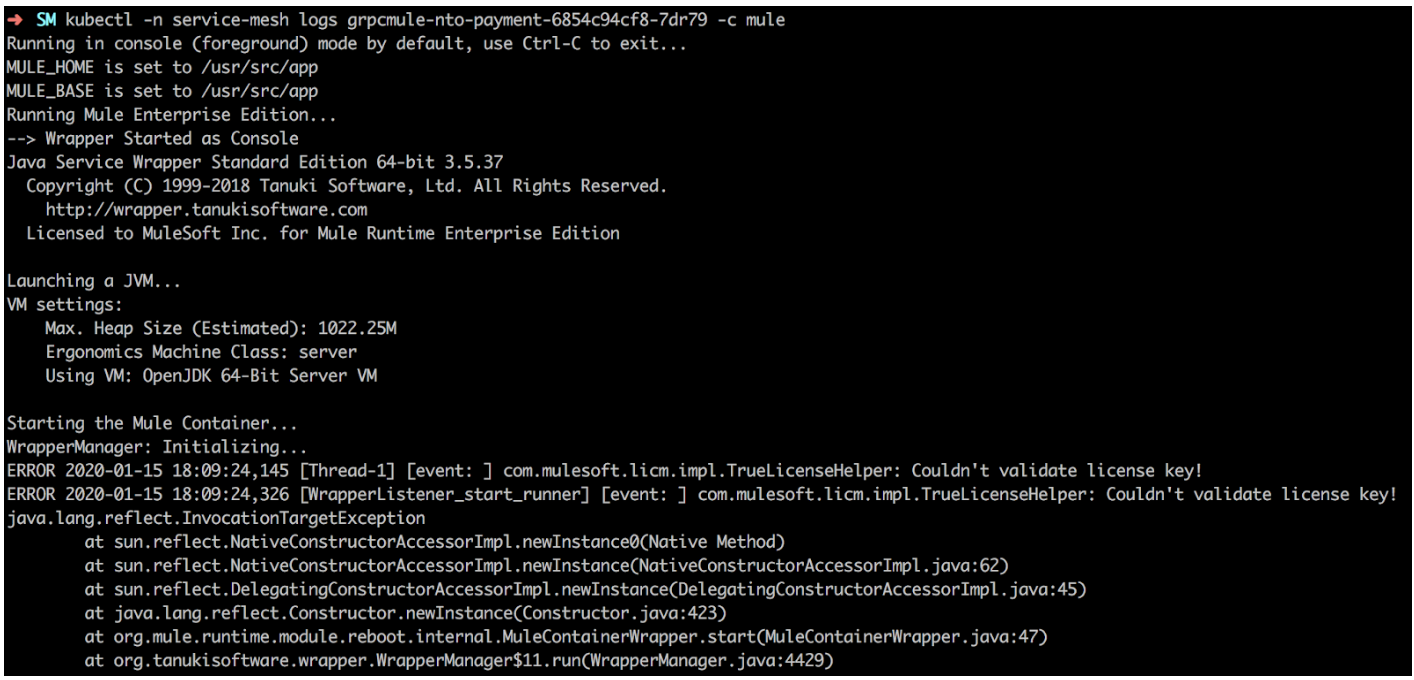apiVersion: v1
items:
- apiVersion: v1
kind: Service
metadata:
creationTimestamp: "2019-10-09T19:08:28Z"
name: hello-kubernetes
namespace: default
resourceVersion: "7075"
selfLink: /api/v1/namespaces/default/services/hello-kubernetes
uid: 2d0719a5-eac8-11e9-93c9-06b247319cf6
spec:
clusterIP: 172.20.177.73
externalTrafficPolicy: Cluster
ports:
- nodePort: 32231
port: 80
protocol: TCP
targetPort: 8080
selector:
app: hello-kubernetes
sessionAffinity: None
type: LoadBalancerTroubleshoot Policy Enforcement Issues
Even though you applied policies to your services, the Mule adapter might not seem to be enforcing these policies, responding with the following error messages:
Service Port Is Not Named
When you create a service, you must provide specifications, such as ports and selectors. Each of these has its own set of parameters that must be defined. When you assign a port to a service, you must also specify a name for that port, such as "http," to avoid an error. Istio requires you to name every port.
Diagnose
To diagnose this issue, verify the definition of the service that exposes the application:
$ kubectl -n namespace get services -o yaml
For example, the following service does not have a named port:
Solution
Istio requires you to name every port. To resolve this error, re-create the service with a named port:
apiVersion: v1
kind: Service
metadata:
name: hello-kubernetes
spec:
type: LoadBalancer
ports:
- port: 80
name: http
targetPort: 8080
selector:
app: hello-kubernetesPolicy Not Disassociated after Deleting Bindings
After you delete the bindings, the policies applied to the service might not be successfully removed.
Causes
When a binding was deleted, an associated traffic rule was not deleted. Because of this issue, traffic is still being sent to the Mule adapter.
Binding Service Name Does Not Match Actual Service Name
When you create the binding, you must provide a service name. If the service name provided does not match the actual service name, policies are not enforced.
Diagnose
To diagnose this issue:
-
Review the service bindings using either of the following commands:
-
$ asmctl api binding list -
$ asmctl adapter binding list
-
-
Compare the service with the bindings:
$ kubectl -n <namespace> get services
In the above example, service names must be, for example customer-service, and NOT customers.nto-payment.svc.cluster.nto-cluster
Solution
To resolve this issue:
-
Delete the existing bindings by running any of the commands:
-
$ asmctl api binding delete --name=binding_name --namespace=binding_namespace -
$ asmctl adapter binding delete --name=binding_name --namespace=binding_namespace
-
-
Re-create the bindings to point to the actual services:

Application Pod Does Not Have an Envoy Sidecar
Policies are not enforced due to an Envoy error in the application pod.
Causes
Internal Error with 500 Error Code
The applications managed by Anypoint Service Mesh generate a 500 error code with the following error description:
INTERNAL:grpcmule-nto-payment.handler.service-mesh.INTERNAL:grpcmule-nto-payment.handler.service-mesh
Diagnose
To diagnose this issue:
-
Display the adapter pod:
$ kubectl get pods -n service-mesh -
Retrieve the adapter logs:
$ kubectl -n service-mesh logs $(kubectl -n service-mesh get pod -l namespace=replace_with_namespace -oname) -c muleIf the license has expired, an error similar to the following is displayed:

Solution
To resolve this issue:
-
Replace the existing license with a valid one:
$ asmctl management config license --license=/path/to/license.lic -
Redeploy the adapter:
$ kubectl -n service-mesh patch $(kubectl -n service-mesh get deploy -l namespace=replace_with_namespace -oname) --type=json -p="[{\"op\": \"replace\", \"path\": \"/spec/template/metadata/annotations/kubectl.kubernetes.io~1restartedAt\",\"value\":\"$(date -u +%FT%TZ)\"}]"



